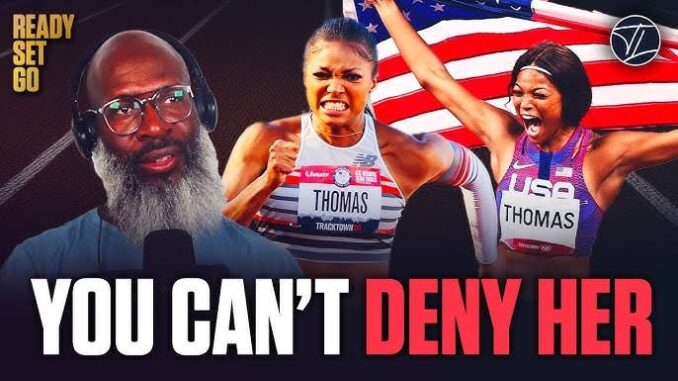
Former Olympic champion Justin Gatlin has never shied away from speaking his mind on matters within the track and field world. This time, the retired American sprinting legend has directed his attention toward fellow U.S. athlete Gabby Thomas, suggesting that she may have stepped over the line with her recent public comments. Gatlin, who spent more than two decades competing at the highest level, believes that Thomas’ statements could have been handled with more care and respect, especially given the weight of her platform and influence.
Thomas, a 200m specialist and Olympic medalist, recently made remarks that drew widespread attention. While she has built a reputation as one of the sport’s most articulate and outspoken figures, her commentary—perceived by some as critical of teammates, rivals, or governing structures—did not sit well with everyone. Gatlin, reflecting on her words, said that while athletes have every right to express themselves, they also carry a responsibility to maintain unity and professionalism. In his view, Thomas’ comments missed that balance.
Gatlin emphasized that track and field is already a sport fighting for visibility in the global market. For him, internal conflicts or divisive public statements can weaken the sense of cohesion needed for athletes to collectively elevate the profile of athletics. “There’s a time and place to speak,” Gatlin reportedly noted in his analysis, “but when you call people out in a way that feels personal or dismissive, it creates rifts that don’t help anyone. We need voices of leadership, not words that fuel division.”
His stance has sparked conversation in track circles. Some agree with Gatlin, arguing that Thomas, though talented and intelligent, might have let frustration guide her message. They suggest that private channels—such as team meetings, athlete commissions, or federation consultations—are better suited for criticism, as opposed to public platforms where comments can easily be misinterpreted or sensationalized.
On the other hand, supporters of Thomas argue that her honesty should be applauded. They believe that track and field needs strong personalities unafraid to speak truth to power, even if that sometimes causes friction. From this perspective, Gatlin’s reaction reflects an older generation’s preference for diplomacy, while today’s athletes are more willing to be direct.
The debate ultimately raises a larger question: how much responsibility do athletes have for maintaining harmony versus pushing for change? Thomas has often been praised for using her platform not only to highlight sporting issues but also to raise awareness about broader social matters. Gatlin himself was no stranger to controversy during his career, from doping suspensions to heated rivalries with Usain Bolt, so his critique carries a layer of irony that some observers have pointed out.
Still, Gatlin’s broader point about unity resonates. Track and field athletes compete individually, but their success and marketability often depend on the collective health of the sport. If internal disputes dominate headlines more than performances, sponsors and fans may disengage. Gatlin, now retired, sees the long-term stakes and wants current stars like Thomas to recognize the bigger picture.
Whether Thomas will respond directly to Gatlin’s critique remains to be seen. What is certain is that the dialogue underscores the tension between tradition and progress in athletics. Athletes want to be authentic and heard, but veterans like Gatlin urge them to balance candor with responsibility. That ongoing balancing act may shape not only Thomas’ future reputation but also the culture of U.S. track and field in the years ahead.
Be the first to comment